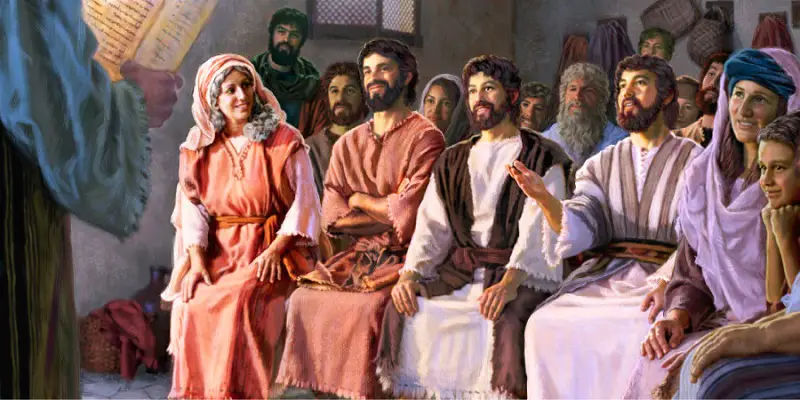Throughout the pages of the Bible, we encounter a tapestry of extraordinary figures—prophets, kings, and ordinary people chosen for divine purposes.
However, among these revered characters lies a sobering truth: many failed God in profound ways.
From their monumental mistakes to quiet moments of disobedience, these stories remind us that even those closest to the divine can falter.
But what do their failures teach us about grace, redemption, and our own spiritual journeys?
As we delve into the lives of these Bible characters who failed God, we expose not only their shortcomings but also the rich lessons embedded within their narratives.
Each misstep serves as a mirror reflecting our own struggles with faith and obedience in an imperfect world.
Join us as we explore how these ancient tales resonate with contemporary believers grappling with doubt and fear—showing that even in failure, there is an opportunity for growth and transformation.
✅ The 5 Bible Characters Who Failed God

Here, we examine some of the most prominent examples of Bible characters who failed God to draw lessons from their experiences.
1. Adam and Eve
Adam and Eve, often recognized as the first humans in the biblical narrative, reveal profound insights into the nature of failure and free will.
Their choice to eat from the forbidden tree wasn’t just a momentary lapse in judgment; it symbolizes humanity’s quest for autonomy and understanding that comes with dire consequences.
In their pursuit of knowledge, they inadvertently disrupted the perfect harmony intended by God, showcasing how a single act can have ripple effects throughout history.
This story serves as a poignant reminder that even those closest to divine intentions can falter when faced with temptation.
In reflecting on Adam and Eve as Bible characters who failed God, we also encounter themes of vulnerability and accountability.
Their failure is not simply about disobedience but also highlights the complexities of human relationships—between each other and with God.
Eve’s dialogue with the serpent demonstrates how doubts can seep into our convictions, leading us astray, while Adam’s complicity emphasizes his role in this shared downfall.
Through their story, we learn that failure is part of our spiritual journey; it invites us to seek redemption rather than succumb to despair.
Ultimately, their experience underscores God’s enduring grace—a constant invitation for humanity to return to Him after falling short.
2. King Saul
King Saul stands as a powerful reminder that even those chosen for greatness can falter.
Initially anointed as Israel’s first king, his tragic arc unveils how fear and disobedience led him away from God’s favor.
While many remember Saul for his towering stature and military prowess, it’s crucial to delve deeper into the internal struggles he faced—struggles that mirror our own moments of self-doubt and moral compromise.
Saul’s failure is emblematic of the dangers of neglecting divine instructions in pursuit of personal ambition.
When he chose to spare King Agag and the best livestock contrary to God’s command, it marked a pivotal deviation from divine obedience to self-justification.
This decision did more than cost him his kingship; it unveiled his incapacity to trust God’s plan over human understanding.
The lesson here is clear: success without submission leads only to downfall, reminding us that in our ambitions or leadership roles, unwavering faithfulness should be a priority over popularity or apparent victories.
Through King Saul’s story, we are challenged not just to reflect on our failures but also to seek redemption by aligning ourselves wholeheartedly with God’s will.
3. Samson
Samson, one of the most iconic biblical figures who failed God, embodies both extraordinary strength and profound weakness.
Gifted with immense power to defend Israel against the Philistines, his life serves as a cautionary tale about the perils of succumbing to temptation and neglecting divine purpose.
Instead of leveraging his God-given abilities for righteousness, Samson often pursued personal desires over faithful obedience, leading him down a path that ultimately resulted in his downfall.
His relationship with Delilah epitomizes this tragic conflict.
Rather than nurturing his calling as a Nazirite dedicated to God, he allowed himself to be ensnared by love tainted with betrayal.
This alliance not only cost him his strength but also culminated in a dramatic loss of identity and purpose — an unsettling reminder that even those chosen by God can stray profoundly from their mission when entangled in sin.
Ultimately, Samson’s story invites readers to reflect on their own vulnerabilities: how easily they might surrender their convictions for fleeting pleasures and what it means to truly submit one’s life to God’s will amid inherent human frailty.
4. David
David, often celebrated as a man after God’s own heart, exemplifies the complex reality of human imperfection in biblical figures who failed God.
His life is a tapestry woven with triumphs, such as defeating Goliath and uniting Israel, alongside profound failures that reveal his vulnerabilities.
The notorious episode involving Bathsheba showcases how a moment of lust can lead to devastating consequences not just for oneself but also for an entire community.
David’s journey reminds us that even those closest to God are susceptible to moral failure; this duality emphasizes the importance of humility and accountability.
However, what sets David apart is not merely his transgressions but his responsive heart toward repentance.
After being confronted by Nathan the prophet, David’s raw anguish illuminated the path back to grace (Psalm 51).
This act of contrition highlights a crucial aspect of faith: acknowledgment and reconciliation rather than denial or defiance.
In reflecting on David’s narrative, we find an enduring lesson about resilience—our failures need not define us if we respond with genuine remorse and seek transformation.
Through David’s story, we understand that while our journeys may be marred by sin, it is our willingness to return to God that shapes our legacy in His eyes.
5. Judas Iscariot
Judas Iscariot stands as one of the most notorious figures among those people in the Bible who failed God.
Known primarily for betraying Jesus for thirty pieces of silver, Judas’s story invites us to reflect on the complexities of human motivation and ambition.
His actions were not merely about financial gain; they speak to a deeper struggle with disillusionment and expectation.
As one of the twelve disciples, he walked closely with Jesus, witnessing miracles firsthand, yet his heart grew distant—a cautionary tale of how familiarity can breed contempt.
Interestingly, Judas’s betrayal was part of a grand narrative fulfilled through prophecy, suggesting that even our failures can serve divine purposes.
However, his choice underscores a chilling reality: proximity to holiness does not guarantee faithfulness.
In today’s world where believers encounter their own moments of doubt and temptation, Judas challenges us to examine our motivations and align them more closely with our faith rather than with societal expectations or personal gain.
Ultimately, while he serves as an exemplar of failure, he also offers a profound lesson on accountability—reminding us that every decision we make shapes the tapestry of our spiritual journey.
Lessons to Learn from Bible Characters Who Failed God

Through the stories of failure, however, there are also valuable lessons to be learned about faith, obedience, and humility.
By studying these examples we can gain understanding and wisdom to help us on our own journeys with God.
I. The Importance of Repentance and Seeking Forgiveness
The Bible is a book full of teachings and lessons that can guide us in our daily lives.
One of the most important teachings in the Bible is about repentance and seeking forgiveness.
According to the Bible, repentance means turning away from sin and towards God, while seeking forgiveness involves asking for God’s mercy and grace.
The importance of repentance and seeking forgiveness cannot be overstated. The Bible teaches us that we are all sinners who fall short of God’s glory.
However, through repentance and seeking forgiveness, we can experience redemption and salvation.
Without these essential steps, it is impossible to receive the fullness of God’s love and blessings.
In addition to being crucial for our spiritual well-being, repentance and seeking forgiveness are also vital for our relationships with others.
II. The Power of Redemption and Restoration
The Bible is an intricate and complex work that spans thousands of years.
It tells the stories of people who were both flawed and fantastic, and it also speaks to the power of redemption and restoration.
This book is a source of inspiration for millions of people around the world, as it teaches them about the potential to overcome their mistakes.
One common theme in the Bible is that redemption and restoration are always possible.
No matter how far someone might have strayed from their path, there is always a chance for them to return to righteousness.
This message speaks to those who feel lost or without hope, reminding them that there is always a light at the end of the tunnel.
Furthermore, this message also applies beyond just personal struggles. The idea of redemption and restoration can apply on a societal level as well.
Communities can come together after tragedies or conflicts, seeking out justice and peace through forgiveness and healing.
III. Learning from Mistakes and Growing from Failure
Learning from mistakes and growing from failure is essential for personal growth and development.
The Bible teaches us that mistakes and failures can be used as opportunities to learn, grow, and improve ourselves.
In fact, some of the most significant lessons in life come from our failures rather than our successes.
One example of this is found in the story of King David in 2 Samuel 11-12. David committed adultery with Bathsheba and then arranged to have her husband killed to cover up his sin.
When confronted by the prophet Nathan, David recognized his wrongdoing and repented.
Through this experience, David learned an important lesson about the consequences of sin but also experienced God’s forgiveness and restoration.
Another example is found in the parable of the prodigal son (Luke 15:11-32).
Bible Characters Who Failed God (Summary)
Now, it’s clear that Bible characters who failed God provide many lessons that can be applied to everyday life.
They remind us that failure is part of the human condition and that no matter how hard we try, we are all capable of making mistakes.
Furthermore, their stories show us the importance of repentance and redemption, and how God’s grace can still be present even when we have failed Him.
These lessons should give us hope in our own difficult times and inspire us to keep going despite our failures.
Other Blog Posts
- 5 Bible Characters Who Doubted God
- 5 Bible Characters Who Didn’t Give Up
- 5 Bible Characters Who Changed from Bad to Good

Grounded in faith and driven by purpose, I’m a Christian blogger and online research specialist with a passion for God’s Word, lifelong learning, and healthy living.
